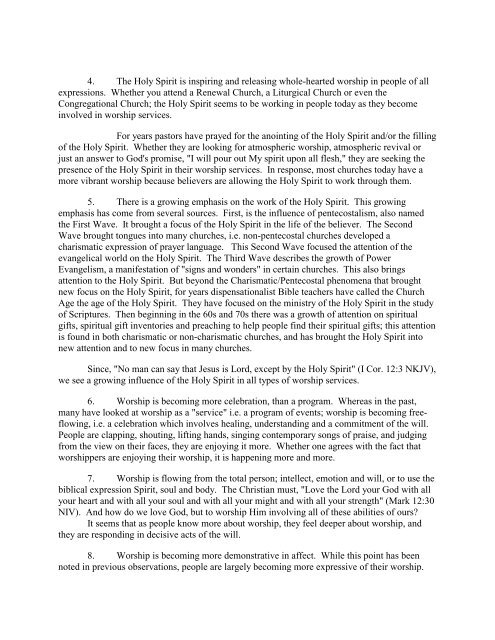PUTTING AN END TO WORSHIP WARS - Elmer Towns
PUTTING AN END TO WORSHIP WARS - Elmer Towns
PUTTING AN END TO WORSHIP WARS - Elmer Towns
- TAGS
- worship
- elmer
- towns
- elmertowns.com
Create successful ePaper yourself
Turn your PDF publications into a flip-book with our unique Google optimized e-Paper software.
4. The Holy Spirit is inspiring and releasing whole-hearted worship in people of all<br />
expressions. Whether you attend a Renewal Church, a Liturgical Church or even the<br />
Congregational Church; the Holy Spirit seems to be working in people today as they become<br />
involved in worship services.<br />
For years pastors have prayed for the anointing of the Holy Spirit and/or the filling<br />
of the Holy Spirit. Whether they are looking for atmospheric worship, atmospheric revival or<br />
just an answer to God's promise, "I will pour out My spirit upon all flesh," they are seeking the<br />
presence of the Holy Spirit in their worship services. In response, most churches today have a<br />
more vibrant worship because believers are allowing the Holy Spirit to work through them.<br />
5. There is a growing emphasis on the work of the Holy Spirit. This growing<br />
emphasis has come from several sources. First, is the influence of pentecostalism, also named<br />
the First Wave. It brought a focus of the Holy Spirit in the life of the believer. The Second<br />
Wave brought tongues into many churches, i.e. non-pentecostal churches developed a<br />
charismatic expression of prayer language. This Second Wave focused the attention of the<br />
evangelical world on the Holy Spirit. The Third Wave describes the growth of Power<br />
Evangelism, a manifestation of "signs and wonders" in certain churches. This also brings<br />
attention to the Holy Spirit. But beyond the Charismatic/Pentecostal phenomena that brought<br />
new focus on the Holy Spirit, for years dispensationalist Bible teachers have called the Church<br />
Age the age of the Holy Spirit. They have focused on the ministry of the Holy Spirit in the study<br />
of Scriptures. Then beginning in the 60s and 70s there was a growth of attention on spiritual<br />
gifts, spiritual gift inventories and preaching to help people find their spiritual gifts; this attention<br />
is found in both charismatic or non-charismatic churches, and has brought the Holy Spirit into<br />
new attention and to new focus in many churches.<br />
Since, "No man can say that Jesus is Lord, except by the Holy Spirit" (I Cor. 12:3 NKJV),<br />
we see a growing influence of the Holy Spirit in all types of worship services.<br />
6. Worship is becoming more celebration, than a program. Whereas in the past,<br />
many have looked at worship as a "service" i.e. a program of events; worship is becoming freeflowing,<br />
i.e. a celebration which involves healing, understanding and a commitment of the will.<br />
People are clapping, shouting, lifting hands, singing contemporary songs of praise, and judging<br />
from the view on their faces, they are enjoying it more. Whether one agrees with the fact that<br />
worshippers are enjoying their worship, it is happening more and more.<br />
7. Worship is flowing from the total person; intellect, emotion and will, or to use the<br />
biblical expression Spirit, soul and body. The Christian must, "Love the Lord your God with all<br />
your heart and with all your soul and with all your might and with all your strength" (Mark 12:30<br />
NIV). And how do we love God, but to worship Him involving all of these abilities of ours?<br />
It seems that as people know more about worship, they feel deeper about worship, and<br />
they are responding in decisive acts of the will.<br />
8. Worship is becoming more demonstrative in affect. While this point has been<br />
noted in previous observations, people are largely becoming more expressive of their worship.
















